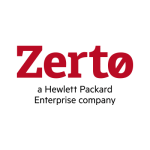What is our primary use case?
My purpose for utilizing CloudEndure Disaster Recovery is to streamline our disaster recovery procedure. In the event of any issue arising in our on-premise infrastructure, we aim to quickly switch over to AWS. Our setup is designed to facilitate this process, and we frequently conduct tests to ensure its reliability. While we have yet to experience an actual disaster, we conduct multiple tests annually. Furthermore, as a partner, I implement this solution for our clients. Currently, we have five customers using it, with the number steadily increasing.
We have the solution deployed on-premise located on the Amazon AWS infrastructure.
How has it helped my organization?
Although we have not yet utilized it for an actual disaster, one of our clients has been affected by ransomware or similar attacks. It is crucial to be able to quickly restore their infrastructure outside of their primary infrastructure, and that is exactly what we are accomplishing with this solution. Since the client we are working with is not a large enterprise, they do not have the financial resources or budget to create a secondary site for disaster recovery. Our solution enables them to be prepared without having to allocate funds for a complete data center to perform the restoration.
What is most valuable?
The most valuable aspect of CloudEndure Disaster Recovery is its instant block replication feature. This allows us to perform live block verification and eliminates the need to concern ourselves with recovery point objectives. This capability is particularly advantageous for critical workloads.
What needs improvement?
The failback could be improved. It should be more intuitive.
For how long have I used the solution?
I have been using CloudEndure Disaster Recovery for approximately one and a half years.
What do I think about the stability of the solution?
The stability could be improved. There is sometimes a lag in the replication and we have to reinstall the agent. It does not happen all the time but when it does in a particular server we need to reset it. A lot of our customers are relying on this solution and this is not a good scenario.
What do I think about the scalability of the solution?
I rate the scalability of CloudEndure Disaster Recovery a ten out of ten.
How are customer service and support?
I have worked with the support once and I had a good experience.
I rate the support of CloudEndure Disaster Recovery a nine out of ten.
How would you rate customer service and support?
How was the initial setup?
The initial setup of CloudEndure Disaster Recovery was simple with the new interface.
What about the implementation team?
Both the customer and I are responsible for implementing the solution.
What was our ROI?
We have seen a return on our investment. When compared to the cost of building a complete data center, the solution is much more affordable. However, it can still be expensive for small customers since the snapshots require significant storage space. While the solution itself may not seem costly on paper, keeping several days of snapshots can increase the price. This is due to AWS EDS storage costs since that is what we are using for the snapshots.
What's my experience with pricing, setup cost, and licensing?
I rate the price of CloudEndure Disaster Recovery a six out of ten.
What other advice do I have?
Before implementing CloudEndure Disaster Recovery, my advice to others is to thoroughly read the documentation. We made some mistakes during our initial implementation, which caused problems and incurred additional costs. We attempted to failover a few servers just to test the solution but later realized that we couldn't simply delete them and resync from on-premises. We had to perform a full rollback, which we were not prepared to do at the time. As a result, we were unable to stop the server running on AWS and had to delete it entirely, causing us to start the synchronization process from scratch. This was a significant issue, especially since the server was a large five-terabyte space server. By carefully reading the documentation, you can avoid making such mistakes.
I rate CloudEndure Disaster Recovery an eight out of ten.
Which deployment model are you using for this solution?
On-premises
Disclosure: I am a real user, and this review is based on my own experience and opinions.









